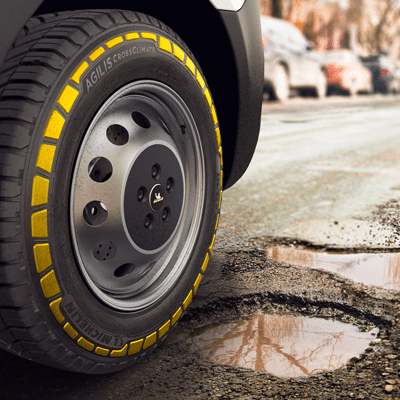
Which commercial van tyres to optimise TCO?
Which commercial van tyres to optimise TCO?
As a light commercial vehicle fleet manager, you face major challenges that require continuous and strategic attention. One of them is cost control. In this article, we'll look at how you can optimise the TCO (Total Cost of Ownership) by selecting the most suitable commercial van tyres. We will also examine how, while controlling your costs, you can ensure the safety of your drivers and thereby comply with CSR (Corporate Social Responsibility).
SUMMARY:
1. Optimise TCO (Total Cost of Ownership) of your van fleet
What is TCO?
TCO, or Total Cost of Ownership, is the indicator that includes all the expenses and costs associated with the purchase and use of a vehicle within a fleet. This concept enables managers to understand the overall financial impact of each vehicle, well beyond the initial purchase price. By taking into account elements such as fuel, maintenance, repair and insurance costs, as well as depreciation and administrative costs, TCO provides an overview of long-term expenses.
The impact of tyres on TCO
Believe it or not, tyres have a direct impact on over 50% of our customers' operating costs (1)! This is because their impact extends far beyond the initial purchase price of the tyre, and directly affects the vehicle’s fuel usage, maintenance and productivity.
How do you optimise TCO of your LCV fleet?
Several strategies can be implemented to achieve this objective.
Reducing fuel costs
Tyres play a crucial role in vehicle fuel consumption. By investing in low rolling resistance commercial van tyres, you can make substantial savings over time.
Switching from tyres with a C rolling resistance label to a B label can result in fuel savings of around 0.2 litres per 100 km(2).
On a fleet of several light commercial vehicles covering thousands of kilometres, the cumulative savings are therefore significant.

Make substantial savings thanks to LCV tyres
Reducing downtime
Vehicle downtime represents a significant cost for fleet managers. By reducing this downtime, you can significantly optimise TCO.
To achieve this, we recommend investing in more robust and long-lasting tyres. With van tyres designed to withstand wear and harsh conditions, you can reduce the frequency of replacements and repairs, which in turn means a reduction in the costs associated with frequent removal and fitting.
By using more durable van tyres, the need to maintain a large stock of spare tyres is also minimised. This reduces storage and stock management costs, freeing up financial resources for other investments.
Improving productivity
Fleet productivity is directly linked to the time vehicles spend on the road. By investing in long-lasting commercial van tyres, you can also maximise this time and therefore improve productivity.
Long-lasting tyres require fewer replacements, which reduces operational downtime. Reduced downtime means that vehicles can spend more time transporting goods, increasing overall business productivity.
Equipped with these van tyres, vehicles benefit from better overall performance: they remain operational for longer and your productivity is therefore optimised.
2. Remain compliant with the CSR (Corporate Social Responsibility)
CSR (Corporate Social Responsibility) is a management approach in which companies integrate social, environmental and economic concerns into their activities. This means that, in addition to aiming for financial profits, companies take into account their impact on society and the environment.
To meet these needs, two points are essential:
Safety
The choice of tyres is crucial to driver safety and offers fleet managers peace of mind. The right van tyres can ensure optimum safety all year round.

Van tyres with robust sidewalls offer greater resistance to damage and increases driver safety
Opt for robust van tyres with strong sidewalls
Tyres with robust sidewalls offer greater resistance to damage, which reduces the risk of rapid deflation or failure and increases driver safety. This is particularly important when operating on difficult terrain, when carrying heavy loads, or in multi-drop final mile applications where vehicles are at frequent risk of kerbing.
Opt for all-season van tyres
All-season tyres marked 3PMSF (3 Peak Mountain Snowflake) are certified to offer excellent performance in winter conditions, while remaining effective all year round. By making this choice, you don't need to swap tyres in winter, which simplifies management and ensures safety at all times.
To watch this video, you'll have to accept some cookies from Youtube platform. Just click on the button below to open the cookie module.
Accept youtube cookiesEnvironmental protection
Protecting the environment is an essential part of CSR. By choosing long-lasting van tyres, you can reduce the environmental impact of your fleet. Sustainable tyres require fewer replacements, reduce the amount of waste and the resources needed to manufacture new tyres. This longevity contributes to greener fleet management.
To find out more, read our article on choosing sustainable commercial van tyres.
3. Which van tyres meet these needs?
Our MICHELIN Agilis tyres family is ideal for meeting your needs in terms of TCO optimisation, safety and sustainability.
In fact, this range offers:
- Long-lasting van tyres:
with MICHELIN Agilis CrossClimate tyre , 35% fewer tyres are replaced than All Season Competitors.(3)
- Lower fuel costs thanks to low rolling resistance :
MICHELIN Agilis 3 tyre reduces fuel costs by 15% vs Premium Summer Competitors on average.(4)
- Lower CO2 emissions:
MICHELIN Agilis 3 tyre reduces total CO2 emissions in usage by around 15%.(5)
- More time on the road:
MICHELIN Agilis CrossClimate tyre reduces the time spent on tyre replacement activities during a vehicle’s lifetime by around 40%, thanks to the high mileage potential.(6)
- Safety:
MICHELIN Agilis CrossClimate tyre unique sidewall impact shields, combined with an abrasion-resistant compound based on innovative truck technology, ensure the van tyre's robustness.
Other articles to find out more:
Need more advice? Discover our Light commercial vehicle guide
1)MICHELIN internal analysis
2) Calculation based on the following simulation for 100 km: based on Value Tool for an internal simulation with C label tyres on Rolling Resistance on average (7.4 kg/tons) vs B label tyres on Rolling Resistance on average (6.2 kg/tons) for 1 LCV with 4 tyres, with an annual mileage per vehicle of 25,000 km (a) with on average fuel cost of 1.51€ TTC/L (b). (a) https://mobilityobservatory. arval.fr/tco-scope-2023 (p.34) - Annual Mileage 25,000 km. (b) Diesel prices around the world, 26-Jun-2023 GlobalPetrolPrices.com.
3) Value Tool for Fleet for an internal Fleet Simulation on MICHELIN Agilis CrossClimate on dimension 235/65 R16 115/113R for 1 LCV with 4 tyres, with an annual mileage per vehicle of 17,863km based on average Van mileage of UK (17,500km from https://assets.publishing.service.gov.uk/government/uploads/system/uploads/attachment_data/file/1065072/van-statistics-2019-to-2020.pdf)& Germany (19,839km from https://topgear-autoguide.com/category/traffic/annual-mileage-in-germany-cars-cover-14259-km1607664895)& France (16,250km from https://www.statista.com/statistics/1108172/average-distance-traveled-by-vehicle-utility-lightweight-france/ ) and a vehicle lifecycle period of 12 years from ACEA vehicle in use 2023 report. Results may vary according to usage, road and weather conditions (a) (b); 28 tyres MI Agilis CrossClimate will be replaced vs 43 on average vs All Season Competitors (Continental VanContact 4 Seasons (48) ; Pirelli Carrier AllSeason (44) ; Goodyear Vector 4Seasons Cargo (44); Bridgestone Duravis All Seasons (36).
(a) Calculation based on Longevity - Longevity Tests conducted by DEKRA Test Center on Michelin’s request, in 2017, on dimension 235/65 R16C 115/113 R, on Mercedes-Benz Sprinter, in comparison with its major all-season competitors (MICHELIN Agilis CrossClimate (33,373 km), CONTINENTAL VanContact4Season (19,065km), PIRELLI Carrier All Season(21,360 km),
Longevity test run in average real usage (D50) with 10,000 km run, and extrapolated with estimated longevity at 1.6mm.
(b) Longevity Michelin internal study conducted in presence of DEKRA Test Center (Narbonne Track), in December 2020- February 2021, on dimension 235/65R16C 115/113 R, on Renault Master, MICHELIN Agilis CrossClimate (33,373 km) in comparison with BRIDGESTONE Duravis All Season (25,029 km)and GOODYEAR Vector 4 Seasons (20,168 km).
Longevity test run in average real usage (D50) with 9,421km run, and extrapolated with estimated longevity at 1.6mm.
(4) Value Tool for Fleet for an internal Fleet Simulation on MICHELIN Agilis 3 on dimension 235/65 R16 115/113R for 1 LCV Diesel, with an annual mileage per vehicle of 17,863km based on average Van mileage of UK (17,500km from https://assets.publishing.service.gov.uk/government/uploads/system/uploads/attachment_data/file/1065072/van-statistics-2019-to-2020.pdf)& Germany (19,839km from https://topgear-autoguide.com/category/traffic/annual-mileage-in-germany-cars-cover-14259-km1607664895)& France (16,250km from https://www.statista.com/statistics/1108172/average-distance-traveled-by-vehicle-utility-lightweight-france/ ) and a vehicle lifecycle period of 12 years from ACEA vehicle in use 2023 report. Results may vary according to usage, road, weather conditions and Rolling Resistance measurement. MI Agilis 3 (4314€) vs Summer Premium Competitors (Continental VanContact 100(4919€) ; Pirelli Carrier (5298€) ; Goodyear EfficientGrip Cargo 2 (4844€); Bridgestone Duravis R660 (5449€).
(5) Value Tool for Fleet for an internal Fleet Simulation on MICHELIN Agilis 3 on dimension 235/65 R16 115/113R for 1 LCV Diesel, with an annual mileage per vehicle of 17 863km based on avrerage Van mileage of UK (17,500km from https://assets.publishing.service.gov.uk/government/uploads/system/uploads/attachment_data/file/1065072/van-statistics-2019-to-2020.pdf)& Germany (19,839km from https://topgear-autoguide.com/category/traffic/annual-mileage-in-germany-cars-cover-14259-km1607664895)& France (16,250km from https://www.statista.com/statistics/1108172/average-distance-traveled-by-vehicle-utility-lightweight-france/ ) and a vehicle lifecycle period of 12 years from ACEA vehicle in use 2023 report. Results may vary according to usage, road, weather conditions and CO2 emissions to manufacture a tyre, based on Michelin hypothesis 40kg. MI Agilis 3 (7,8 tons) vs Summer Premium Competitors (Continental VanContact 100(8,9 tons ) ; Pirelli Carrier (9,6 tons) ; Goodyear EfficientGrip Cargo 2 (8,7 tons); Bridgestone Duravis R660 (9,8 tons).
(6) Value Tool for Fleet for an internal Fleet Simulation on MICHELIN Agilis CrossClimate on dimension 235/65 R16 115/113R for 1 LCV, with an annual mileage per vehicle of 17,863km based on average Van mileage of UK (17,500km from https://assets.publishing.service.gov.uk/government/uploads/system/uploads/attachment_data/file/1065072/van-statistics-2019-to-2020.pdf)& Germany (19,839km from https://topgear-autoguide.com/category/traffic/annual-mileage-in-germany-cars-cover-14259-km1607664895)& France (16,250km from https://www.statista.com/statistics/1108172/average-distance-traveled-by-vehicle-utility-lightweight-france/) and a vehicle lifecycle period of 12 years from ACEA vehicle in use 2023 report . MI Agilis CrossClimate 5 hours need on dealer services around tire SMR vs All Season Competitors (Continental VanContact 4 Seasons 10h; Pirelli Carrier AllSeason 9h; Goodyear Vector 4Seasons Cargo 10h; Bridgestone Duravis All Seasons 8h). Based on 1 hours to change a set of tyre on average based on https://www.ad.fr/guides/guide-conseil/pneumatique/combien-de-temps-pour-changer-un-pneu. Results may vary according to usage, road and weather conditions.




